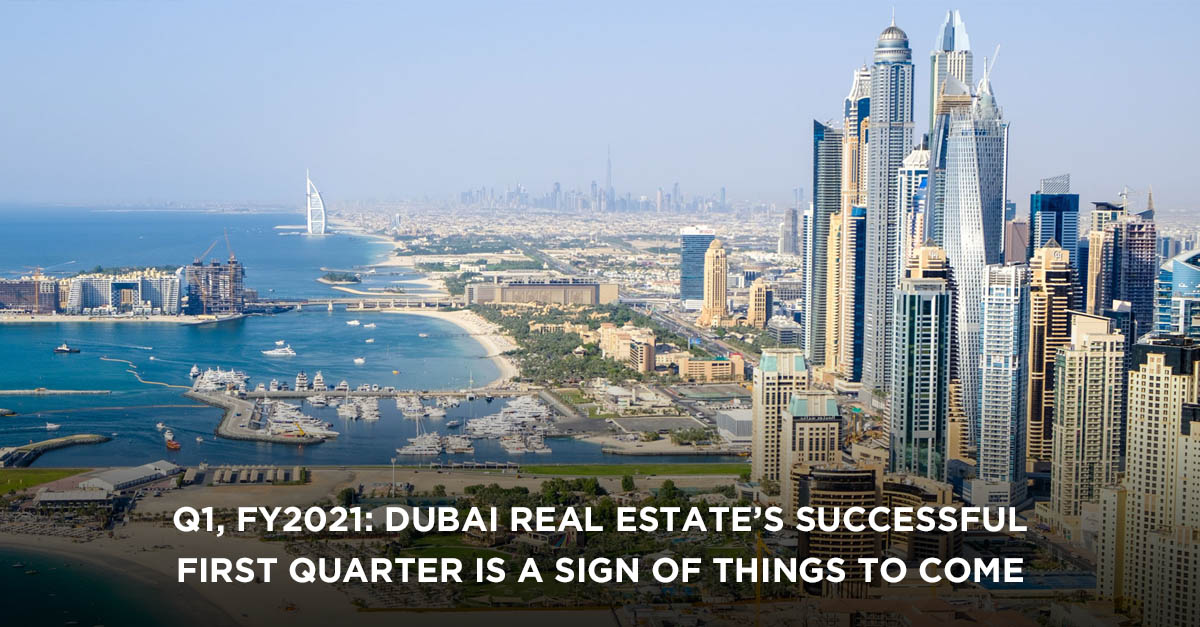Q1, FY2021: Dubai real estate’s successful first quarter is a sign of things to come
The UAE confirmed its first COVID-19 case on 29 January, 2020. At the time, the nation was riding the Expo wave, engrossed in preparations for the upcoming mega event. The regional real estate sector, in particular, was the centerpiece of the event, due to its close ties with hospitality and the service sector. But, in just a span of two months, everything came to a standstill, with the rescheduling of Expo, restrictions to mobility, and a public health crisis at hand.
Fast forward to a year later, and the public discourse has shifted to post-pandemic aspects. And the UAE finds itself in a leading position, in terms of economic outlook, vaccination rate and overall socio-political climate. The nation has successfully managed to navigate the crisis, while simultaneously setting itself up for post-pandemic growth. This success was substantiated recently by the IMF’s economic forecast for 2021, which confirms that the UAE is poised for massive growth. And experts are witnessing the upturn in real estate too, based on official sales and mortgage numbers recorded in the first couple of months this year.
Back to pre-pandemic sales
According to official and reliable sources, sales have increased by 31% in Q1, FY21, compared to the corresponding period last year (Q1, FY20). Also, buyer registrations have increased by a whopping 34%, consisting mainly of Chinese, Indian and European investors. Such gains are unlike any other leading market – some of which are still reeling under the pandemic pressure. While affordability is the primary driver behind increasing sales, many experts believe that the changing perception of Dubai, from a work-and-leave city to a career-and-home city, is driving the new wave of upturn. This has fueled the homebuying aspirations of first-time buyers, and encouraged other existing homeowners to upgrade, and get their hands on properties that were previously “out of budget”.
New dynamics in rental segment
Tenant registrations in the last couple of months have increased by 17%, driven mostly by companies. Partly due to the upcoming, rescheduled Expo, and mainly due to the arrival of many MNCs in the UAE, following the full-ownership law, the rental market is generating demand, particularly from European nationals. Since these new tenancy contracts involve the companies themselves, rather than individual tenants, owners are able to achieve premium rents and enter into long-term contracts. In time, as these new expats acquaint themselves with the city and the
promises it holds, they could be encouraged for longer stays and home ownership. In fact, the increasing population in Dubai lends credence to this possibility.
More integration with financial institutions
The same period saw mortgage transactions increase by 34%. This, obviously, boils down to decade-low borrowing rates, owing to Central Bank’s cuts by 50 basis points. Experts believe that this proved to be the final incentive that forced the buyers on the fence to take the plunge, and close the sale. First-time buyers also saw their chances brighten with 5% LTV increase. The mortgage-friendly ecosystem is likely to entice more borrowers, which could bring more liquidity into banks, and benefit the overall health of the economy. To that end, the conception and implementation of the AED126-billion stimulus package can be deemed an all-round success.
All the aforementioned aspects are collectively tilting the market in favour of sellers, according to a Colliers survey. Many surveyed homeowners are holding out for a “better deal”, especially in light of recent upturn. This trend is rather pronounced in Dubai’s popular areas, where demand is ever present. Such intricate supply-demand dynamics lend an even playing field for market forces, while the sector as a whole stands to benefit. Unlike previous upturns and short-lived market fluctuations, this scenario is characterized by concomitant factors like a strong economic outlook, favourable open-market policies, and most importantly, the successful handling of a global pandemic. It is therefore safe to expect massive growth in the real estate sector, in the foreseeable future.




